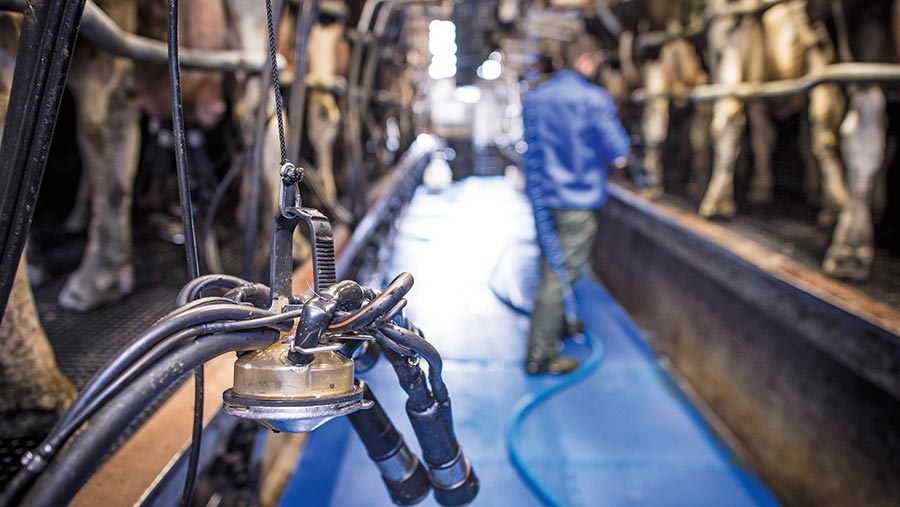Tips on staff management from 4 dairy farmers
 © Jim Varney
© Jim Varney Dairy farmers could be facing a worsening labour shortage on UK farms post-Brexit, with 56% of farmers employing people from the EU.
The findings of the RABDF survey show the sector needs to maintain crucial access to workers from European countries.
However, deeper-rooted problems within the sector mean the industry must become much better at selling itself as an attractive place to work to young people and those outside the sector.
See also: Certification and staff training – all you need to know
Speaking at LIC’s Pasture to Profit conference in Birmingham on Tuesday 16 October, four dairy farmers gave their tips on staff recruitment and management.
Contributors
- Robert Craig
- Karen Halton
- Richard Smith
- Chris North
Robert Craig, Cairnhead Farm, Carlisle, Cumbria
- Soon to be milking 1,450 cows across three sites
- Employs 18 people
- Block-calving, grass-based systems
Karen Halton, Halton Farms, Congleton, Cheshire
- Milking 560 three-way-cross cows all-year-round
- 222ha tenanted
Richard Smith, LKR Farms, Long Bredy, Dorset
- Milking 500 cows once-a-day
- 303ha
- Spring calving, grass-based system
Chris North, Ruddle Court Farm, Newnham on Severn, Gloucester
- Equity partner with ARC Farming
- Will be milking 350 cows by September 2019
- 240ha organic block
- 25-year Farm Business Tenancy
1. Learn to delegate responsibility and accept people are not perfectionists
“If you are a perfectionist, it’s hard to employ people. I thought people would do things the way I wanted them done. I learned the hard way.”
Robert Craig said at the beginning he really struggled to give people responsibility, too.
A wealth-creation course in 2007 was a “game-changer” and helped him clearly understand and realise one of his goals, which was to have more time off from the farm.
“I haven’t milked cows since 2010 and that has allowed me to choose how I spend my time,” says Mr Craig, who sits on the council for RABDF.
Advice
- Find out what employees are good at and fill the gaps.
- Employ people that can manage people – that is key.
- If the end result is achieved, you should give staff flexibility on how they get there – even if it isn’t how you would do it.
- Let staff learn from mistakes as you have done.
- Identify what’s really important and don’t compromise on those aspects of the business – such as animal welfare or farm cleanliness – and make that clear to employees.
2. Sell yourself to prospective employees
A lot of farm job adverts don’t really tell you about the job, says Mr Craig, who researched lots of paper advertisements before recruiting for six vacancies.
He says that the salary should be advertised and that farmers need to get better at “selling the job”.
His business set up a trainee dairy scholarship, which gives a young person £1,000 to travel to New Zealand and work on a dairy farm for one year.
“It’s about getting really good experience. Whether or not we retain them in our business is not really an issue, because we have good people being retained within the industry.”
Meanwhile, the Haltons offer a £500 incentive for employee recommendations, providing the person stays for a minimum of six months.
They also provide weekly massages from a therapist for staff.
Advice
- While salary information is not a legal requirement, it is best to include this information alongside attractive benefits such as housing within a job advert so that candidates are clear on what is on offer.
- Think outside the box – what can you offer staff to really sell yourself and compete with other businesses outside farming?
- Don’t just rely on traditional methods of advertising. Social media is a great platform – or could you work more closely with local schools, colleges and universities?
3. Get rid of bad apples swiftly
Get rid of poor performers swiftly, before they infect “the rest of the cart”, advises Karen Halton, who was previously the director of a London-based legal recruitment consultancy.
The Haltons have a three-month probation period for new staff, and if work slips after this they work closely with an HR firm and give staff written warnings.
“Quite often everyone is on their best behaviour during probation but can become stale afterwards. I watch and home in on that person, and every time we have a slip-up I try to manage it.”
Advice
- Manage bad apples out of the business.
- Address issues head-on and don’t be afraid to give warnings.
- Use an HR firm to stay compliant with the latest regulations.
4. Don’t take it personally
It’s easy to take it personally when staff don’t turn up to work, for example, because living on the farm can make it more personal.
But remember: you are running a business and it happens in other industries, advises Mrs Halton.
Advice
- Separate work from home life.
- Don’t take staff problems personally.
5. Be flexible with working hours
Richard Smith reckons moving to once-a-day milking has helped his family’s dairy business attract more staff.
“It makes it much more viable for people looking for a part-time job. This immediately broadens your pool of people.”
Mr Smith employs four milkers part time and they do an average of four to five hours a day.
Milking starts at 7.30am and is more flexible than twice-a-day start times – and can be fitted in around school pick-ups, he adds.
Advice
- Consider being more adaptable when it comes to working hours – could people do shifts, for example?
- Keep pay competitive at above the hourly rate.
6. Communicate with staff
Chris North believes keeping all employees in the loop is a key management technique.
“When we walk the grass, we all walk together; it’s a good time to talk and we can discuss the grass there and then.”
He says regular catch-ups throughout the day also enable him to get a feel of how everyone’s day has gone.
Advice
- Take time to talk to your staff.
- Allow them to understand the goals of the business. In a low-payout year, show them the CFP (comparable farm profit) and make them understand why the farm has to reduce spend.
- Remember to say thank-you for a job well done.




